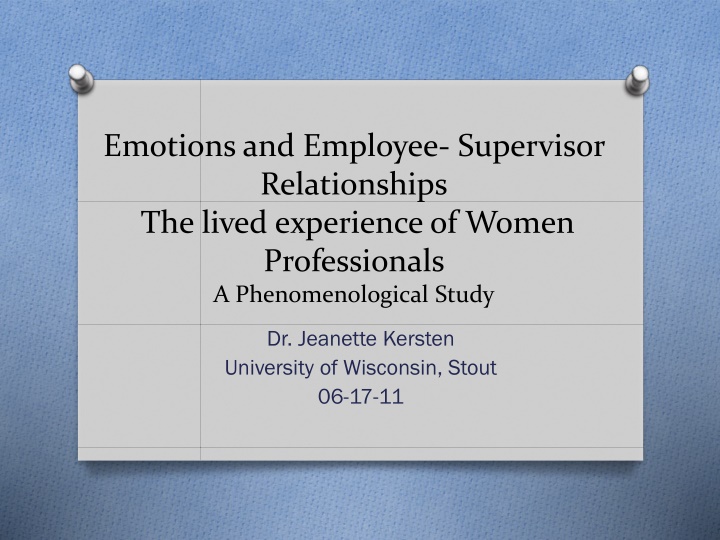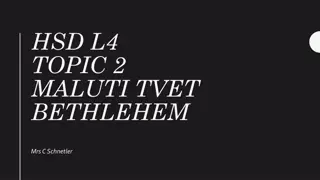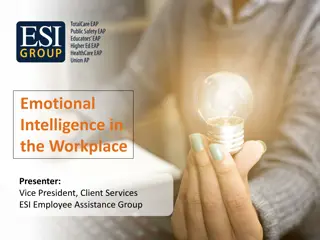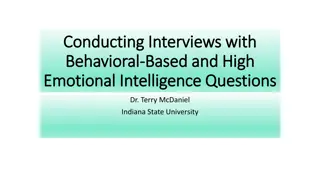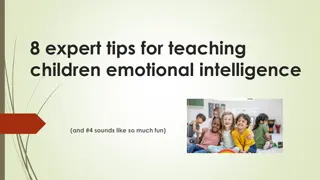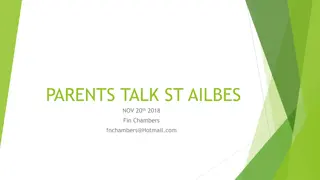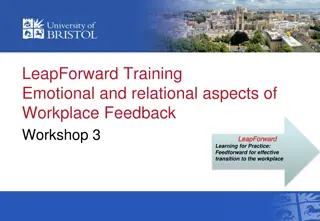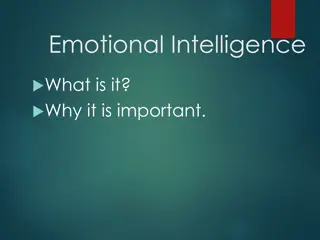Women Professionals' Emotional Intelligence in Workplace Relationships
Exploring the experiences of women professionals in workplace relationships, this study delves into emotional expression, regulation, and the impact on job satisfaction. It highlights the challenges faced by women in organizations and the need for understanding emotional intelligence for effective employee-supervisor relationships.
Uploaded on Sep 01, 2024 | 2 Views
Download Presentation

Please find below an Image/Link to download the presentation.
The content on the website is provided AS IS for your information and personal use only. It may not be sold, licensed, or shared on other websites without obtaining consent from the author.If you encounter any issues during the download, it is possible that the publisher has removed the file from their server.
You are allowed to download the files provided on this website for personal or commercial use, subject to the condition that they are used lawfully. All files are the property of their respective owners.
The content on the website is provided AS IS for your information and personal use only. It may not be sold, licensed, or shared on other websites without obtaining consent from the author.
E N D
Presentation Transcript
Emotions and Employee- Supervisor Relationships The lived experience of Women Professionals A Phenomenological Study Dr. Jeanette Kersten University of Wisconsin, Stout 06-17-11
The way people talk about their lives is of significance, the language that they use and the connections they make reveal the world that they see and in which they act (Gilligan, 1993, p. 2).
Women in Organizations O Women continue to increase representation in the workforce O Recession O 2 income families O Continued barriers to advancement O Despite increased participation, education, & government programs O Career stagnation O Visibility, scrutiny, pressure O Magnified failures with limited attention to successes
Emotional Expression & Organizations O Organizations are emotionally anorexic O Management attempts to regulate emotions O Not acknowledged or valued O Emotions define work relationships O Emotional labor has received little review O Organizational display rules O dictate appropriate emotion display
Emotion Regulation and Emotional Intelligence (EI) O Limited studies on organizational conditions O Emotion states or Emotion regulation O Few studies on individual responses O Minimal on defined groups, i.e. women O Little on emotional awareness and emotional regulation of others O Emotion regulation has focused on O Young children & older adults O Adaptive regulation strategies
Emotion Regulation and Emotional Intelligence (EI) O EI viewed as a skill and/or ability test based O Instruments & Measurement O Good vs. Bad emotions O Most individuals do not know what emotions compel actions O Emotion Regulation is only 1 construct O Most EI & gender studies have occurred outside of US
Workplace relationships O Job satisfaction O Greater task identity, variety, & autonomy O Does not fully explain the complexity of work relationships O Employee-supervisors relationships affect O Effectiveness O Efficiency O Job satisfaction O Job performance O Retention
Statement of the problem O Women bring unique emotional experiences & approaches O Minimal research on emotional experiences of women professionals O EI and emotion regulation O Workplace relationships with supervisors O Few phenomenological studies
Research Question O What is it like for women emotionally in their workplace relationships with supervisors?
Study Timeline Analysis Listening Guide June 2005- September 2006 IRB Approval October 2003 Data Collection Audio taped Interviews November 2003-June 2004 Defense April 2007
Literature Review O Emotion Theory O Emotions, Feelings, Moods, Expression O Emotions in organizations O Emotional Labor O Expression of Emotions in organizations O Emotion Regulation O Goleman s EI Model & Dissenting views O Workplace relationships O Organizational Culture & Climate O Display rules O Women in the workplace
Literature Review O Social relation and emotion architecture theories explored O Emotions an integral component in workplace relationships O Positive emotions critical for: O Skill building, creativity, social relationships, & commitment O Negative emotions subject to emotion regulation
Literature Review O Contributing factors O Gender, politics, & stereotypes O Organizational Display rules O Intense emotional experiences & constant tension O Women more relational O Socialization, self understanding, self efficacy O Interpersonal skills O More predisposed to engage in EI
Research Methods O Phenomenology O Listening to women s experiences O Insights into women s use of emotion O Participant Interviews conducted O Text Analysis using The Listening Guide O EQ In Action Profile administered O Follow up coaching session O Bracketing O Journaling O Self talk & Imagery
Participants O Women who completed 4 year college degree or higher O Employed full time in a professional position O American Association University Women (MN Chapter) O AAUW conference: October 2003 O Minnesota Pine (AAUW Newsletter) O Minnesota Women s Consortium O Minnesota Women s Consortium Fall Newsletter O Not controlled for Gender of supervisor
Participant Profiles *Pseudonyms were uses to ensure confidentiality Pseudonym * Degree Participant Age Range Education Level or Industry Job function Years in Current Job Years in Organization Anne Bonnie 45-54 55-64 Masters Bachelors Healthcare Religious organization Manager Membership Coordinator 5 years 10 years 5 years 10 years Cathleen 63 + Bachelors Government Field Operations Manager Quality Assurance Analyst Research Scientist Nurse 8 Years 36 years Diane 35-44 Bachelors Financial Services 10 years 10 years Eileen 45-54 Masters Social Services Education 2 years 6.5 years Fiona 55-64 Masters 10 years 10 years Gina 45-54 Bachelors Consumer and Office Non profit Sales Manager Marketing Coordinator Educator 27.5 years 3 years 27.5 years Helen 35-44 Masters 3 years Iris 55-64 Masters Education 30 years 30 years Jean 45-54 Bachelors Human Services Community Program Administrator Nurse 10 years 10 years Katie 35-44 Bachelors Government 10 years 10 years
The Listening Guide O Narratives to organize human experiences O Explicate the multiple layers of meaning O Attuned toward organizational constraints, values, & norms O Expression of emotions O Expanded or narrowed relationships O Emotionally regulated or silenced voices O Dr. Susan Letvak, PhD-University of North Carolina, Chapel Hill O Second reviewer O Listening Guide and Data analysis
The Listening Guide4 Sequential Listenings O 1st Listening: Plot or sense of story O 2nd Listening: I poems or voice of self O Cadence & rhythm of voice through description O Researcher in relationship with participant s voices O 3rd Listening: Contrapunal Voices O Complementary and/or contradictory O Layers of meaning O 4th Listening: Analysis of Emerging Themes O Positive and Negative Relational experiences O Learnings & Textual evidence of analysis
6 Positive Relational Themes O Expression and sharing of emotions O Mutual respect leads to trust & autonomy O Communication & collaboration facilitates relationships O Ability to influence supervisor generates optimism O Openness of emotions allows for empathy O Inclusive workplace rules encourage expression of emotions
1) Expression and Sharing of emotions O I was trying not to display a lot of emotions. I wanted to maintain a sense of objectivity and openness to listen to what they were saying without becoming angry or defensive My supervisor was there to help me try to pull it back together .I think just really offering me a space to sort of collect myself with a box of Kleenex and a safe place to respond to that without it being part of the record. (Anne)
2) Mutual Respect Leader to Trust & Autonomy O I was absolutely certain that if there was a difference of opinion between [co-worker name] and me, he s [supervisor] not going to play favorites. He s not going to rule in my favor or [co-worker name] just because he likes one of us better. He s going to play absolutely fair. O I could trust him if it went on my side, then I wouldn t feel that I had gotten an unfair advantage that would make me feel badly. But I could trust him if he went on her side I could accept that. (Eileen)
3) Communication & Collaboration Facilitate Relationship Building O I think I kind of thought about it a lot and then after a while I thought well maybe I need to do a little more maybe I need to go out and try a little harder and what could I do to try to make this work better I could see that she [supervisor] was really feeling like you need to figure out how to make this work. I felt then a challenge to go out and try to do that. (Helen)
3) Ability to Positively Influence Supervisor Generates Optimism O Great. It made me feel well, I guess that s where I get my feelings about my excitement in my work and wanting to do more and better...You feel like you re useful and that your skills are appreciated [by your supervisor] warm and fuzzy. Relaxed and kind of excited you feel kind of charged and turn on. (Cathleen) O It was validating, and you wanted to do more. You want to please. It felt good. It felt good to be able to step out of the box and be creative...I will keep working, and I will keep doing more for that supervisor. (Katie)
4) Openness to Emotions Allows for Empathy O I really thought carefully about how I was going to approach her I didn't want to hurt her feelings. I wanted to acknowledge that she is supporting me and that she is doing a great job .I felt like it was appropriate. (Anne) O The layoffs were very hard I talked with him, empathized with him. I had many talks with him about how difficult that situation was and how much I respected management. I complimented him on the professionalism of how it was handled. It was very well done .He appreciated it. I think mangers always appreciate when you think employees have a little bit of empathy and understanding what they re going through. Because they don t get much positive feedback. (Gina)
5) Inclusive Rules Encourage Expression of Emotions O I had a conversation late the next day in my office with my supervisor where I just went into tears. I just wept. I don't usually do that .He was very supportive on a human level. It was incredibly safe to be that fallen apart. I kind of knew that it would be. (Eileen) O [My Supervisor said,] I understand that if you need to take some sick leave. If you need to talk about it. You can't cry through every visit you make, but it was never discouraged. It was accepted. I think that was a direct result of working with an office of mature professional women (Katie)
5 Negative Relational Themes O Climates of fear drives perceptions of failure, inadequacy, & retaliation O A cycle of anger, frustration, & guilt O Relational conflict fuels distrust, need for control, resistance & avoidance O A sense of powerlessness & futility O Restrictive workplace rules stifle expression of emotions
1) A Climate of fear drives perceptions of failure, inadequacy, & retaliation O I was in my office and a letter was put on my desk by someone I opened [the letter] and that's how I found out about it very awkward my stomach was churning. I was extremely nervous. Sweaty palms (Cathleen) O While I was resolved with sticking up for my individual [employee] I got a letter of reprimand. That was one of the most traumatic things that has ever happened to me in my career . (Cathleen)
2) A cycle of anger, frustration, & guilt O I could see on his face that my interpretation at the time was you re trying to figure out how you re going to get me for saying that honest remark. But inside I felt that I had really hurt his feelings. You know, like he was welling up. I know that hurt his feelings. I know that he is very sensitive. (Jean) O That he really wants to be a good supervisor. He likes me .When we turned to that point during the conversation I was feeling like I was hurting him. That bothers me. I don t like to hurt people. (Jean)
3) Relational conflict fuels distrust, need for control, resistance & avoidance O I let him know up front that my schedule will be changing. I just make sure that I document it in e- mail and keep a copy of it for myself I just want to have a safety net behind me because I can t count on him to defend me. (Diane) O Mostly I work around him .I changed my schedule so that I would only have to work four days. I deliberately search out projects where I'm kind of left independent of any supervision. Most of my communication is through email only. (Diane)
4) A sense of powerlessness & futility O I wanted enthusiasm, and I sort of got this thoughtfulness I was a little disappointed, because you want to be moving forward all the time .Instead it felt like that idea wasn't going to work (Helen) O Because in the long run, I really don t care. I have this mantra twenty-five to thirty years from now, none of this will make a difference. It really won t. It won t be etched on my tombstone .[I feel] exhausted [about relationship with supervisor]. (Jean)
5) Restrictive workplace rules stifle expression of emotions O I wish that there was a rulebook that I knew before entering that part of the company I almost feel like a spy now, working for my own company because I have to hide the way I really feel. O I have work clothes, and I have a work mood I have to get into before I go to work everyday .Like I m wearing a different costume or something that is not me. (Diane)
Discussion of the findings O Emotional experiences were pivotal events O Positive and negative impact O Quality of employee-supervisor relationship O Related to Goleman s Self Awareness (EI) O Self confidence O Trust led to autonomy O Emotion regulation is essential O Establishing & Sustaining relationships
Discussion of the findings O Empathy is a critical element for healthy workplace relationships O Safe work environments encouraged expression of emotions O Trust O Optimism O Motivation O Minimized glass ceiling effect
Discussion of the findings O Fear & anxiety described in physical terms O Depicted as failure & inadequacy O Supervisor perceptions O Loss of relationship, connections, etc. O Increased emotional labor O Increased emotional regulation O Avoidance and withdrawal O Guilt associated with anger O Emotional ambivalence
Discussion of the findings O Greater powerlessness & futility O Ineffective emotion regulation O Physical symptoms O Lack of optimism & Motivation O Organizational Display rules limited women s voices O Backing down", "Giving In O Retaliation: "Made examples of O Community Display rules O Clustered demographic areas O Limited Organizational Diversity
Implications for women O Emotional expression can enhance supervisor relationships O Leverage relationship building skills Effective relationship management O Positively influence through use of EI skills O Empathy fosters healthy workplace relationships O Career advancement
Implications for Women O Insight into negative relational experiences O Emotion suppression & regulation O Understand ineffective emotion regulation O Tension & Conflict O Control O Avoidance O Resistance O Increase self awareness, self reflection, & resiliency
Implications for Supervisors O Create emotionally expressive and supportive work environments O Enhance working relationships through use of EI competencies O Develop women employees through listening, coaching, & mentoring O Opportunities for emotion sharing O Leverage relational capabilities of women O May lessen impact of glass ceiling
Implications for Organizations O Programs to enhance awareness O Emotional expression O Effective emotion regulation O EI techniques O Emotion friendly work environments O Awareness of Organizational & Community Display rules O Impact on Diversity O Worklife balance O Develop and promote women as leaders O Leverage relational talent
Summary O Corroborates the literature O Emotions in the workplace O Positive effects of EI O Emotion regulation O Participants from a variety of work settings/industries O Contributions to the literature O Effects of positive & negative relational experiences O Emotions & Emotion regulation strategies O Opportunities for growth & career advancement O In-depth explication of workplace & community display rules
Recommendations for Future Research O Replicate study in select industries O Women professionals O Women who retired or left the workforce O Women small business owners O Women leaders in Global organizations O Cross cultural international study of women professionals O Evaluation of the effect of supervisor gender O Similar study with increased sample size O Automation of Listening Guide using technology
Reflections O Privilege to listen to the participants and hear their voices O 11 unique women O Increased understanding of the impact of emotions, Emotion regulation & EI O Researcher and Woman Professional O Key learnings about relationships O Appreciation of Phenomenology
Relationship requires connection. It depends not only on the capacity for empathy, or the ability to listen to others and learn their language or take their point of view, but also on having a voice (Gilligan, 1993, p. xix-xx).
References OPlease refer to handout.
